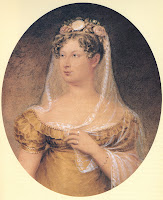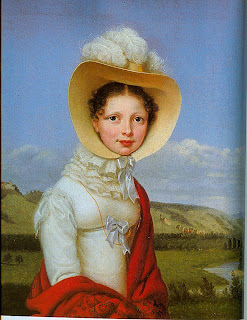by M.M. Bennetts
 Yes, she was a princess. And yes, she had to marry for reasons of state rather than solely based on her personal fancy, but Princess Charlotte (1796-1817), daughter of the Prince Regent and Caroline of Brunswick was no pawn--kind of more the opposite...
Yes, she was a princess. And yes, she had to marry for reasons of state rather than solely based on her personal fancy, but Princess Charlotte (1796-1817), daughter of the Prince Regent and Caroline of Brunswick was no pawn--kind of more the opposite...
Bearing in mind that at the time when ministers of state, and latterly her parents, were scanning the horizon for suitable royal consorts for her, the Napoleonic wars were heading towards, they hoped, a close. Whilst at the same time, the remaining heads of state--those which had survived--were wondering how best to restore order to Europe and reinstate legitimate government (read monarchies) to those countries which Napoleon had annexed to France. So the task of choosing a royal mate was a little more complex than usual.
 Nevertheless, in 1812, the government hit upon a plan. Wouldn't it be perfect if Princess Charlotte were to marry William of Orange? He was of an age with Charlotte, not too old nor too young, he'd seen active service in the Peninsula, so he was a dashing military hero and he was a Protestant (a necessity). What could be better?
Nevertheless, in 1812, the government hit upon a plan. Wouldn't it be perfect if Princess Charlotte were to marry William of Orange? He was of an age with Charlotte, not too old nor too young, he'd seen active service in the Peninsula, so he was a dashing military hero and he was a Protestant (a necessity). What could be better?
William of Orange had been raised in exile in England (so he spoke English!), he'd spent two years at Oxford,and from 1811, he served in the Peninsula under Wellington by whom he was known as 'Slender Billy'.
 Perhaps he wasn't great looking, but he was known to be amiable, there had been another hugely successful marriage between a Prince of Orange and an English princess...And, bliss of blisses, someday he would rule the Netherlands--so through him and any children they might have, Britain would regain a toehold on the Continent, moreover a toehold that was right across the North Sea, thus securing the sea lanes to the Baltic. It was ideal!
Perhaps he wasn't great looking, but he was known to be amiable, there had been another hugely successful marriage between a Prince of Orange and an English princess...And, bliss of blisses, someday he would rule the Netherlands--so through him and any children they might have, Britain would regain a toehold on the Continent, moreover a toehold that was right across the North Sea, thus securing the sea lanes to the Baltic. It was ideal!
There was only one problem: Princess Charlotte.
 Because you see, in the autumn of 1812, she had conceived a rather violent passion for a Captain Charles Hesse of the 18th Hussars, and whilst at Windsor had gone out riding with him every day.
Because you see, in the autumn of 1812, she had conceived a rather violent passion for a Captain Charles Hesse of the 18th Hussars, and whilst at Windsor had gone out riding with him every day.
And after that, she'd been meeting with him secretly at her mother's home in Kensington, where her mother, helpfully, would "let him into her own apartment by a door that opens onto Kensington Gardens...[then] leave them together in her own bedroom, [with the words] 'A present, je vous laisse, amusez vous'." [For the moment I'm leaving you, amuse yourselves...]
As may you appreciate, when the Prince Regent discovered, he was incandescent with rage.
And Charlotte was pretty much locked away with a new governess and with very little company. As the Prince said with some feeling (and almost in echo of Austen's Mr. Bennet): "I know all that passed in Windsor Park; and if it were not for my clemency I would have shut you up for life. Depend upon it, as long as I live you shall never have an establishment, unless you marry."
 Perhaps he wasn't great looking, but he was known to be amiable, there had been another hugely successful marriage between a Prince of Orange and an English princess...And, bliss of blisses, someday he would rule the Netherlands--so through him and any children they might have, Britain would regain a toehold on the Continent, moreover a toehold that was right across the North Sea, thus securing the sea lanes to the Baltic. It was ideal!
Perhaps he wasn't great looking, but he was known to be amiable, there had been another hugely successful marriage between a Prince of Orange and an English princess...And, bliss of blisses, someday he would rule the Netherlands--so through him and any children they might have, Britain would regain a toehold on the Continent, moreover a toehold that was right across the North Sea, thus securing the sea lanes to the Baltic. It was ideal!There was only one problem: Princess Charlotte.
 Because you see, in the autumn of 1812, she had conceived a rather violent passion for a Captain Charles Hesse of the 18th Hussars, and whilst at Windsor had gone out riding with him every day.
Because you see, in the autumn of 1812, she had conceived a rather violent passion for a Captain Charles Hesse of the 18th Hussars, and whilst at Windsor had gone out riding with him every day. And after that, she'd been meeting with him secretly at her mother's home in Kensington, where her mother, helpfully, would "let him into her own apartment by a door that opens onto Kensington Gardens...[then] leave them together in her own bedroom, [with the words] 'A present, je vous laisse, amusez vous'." [For the moment I'm leaving you, amuse yourselves...]
As may you appreciate, when the Prince Regent discovered, he was incandescent with rage.
And Charlotte was pretty much locked away with a new governess and with very little company. As the Prince said with some feeling (and almost in echo of Austen's Mr. Bennet): "I know all that passed in Windsor Park; and if it were not for my clemency I would have shut you up for life. Depend upon it, as long as I live you shall never have an establishment, unless you marry."
Hence, when the proposed match with William was put to Princess Charlotte in February 1813, she was not keen. As she said of him, "I think him so ugly, that I am sometimes obliged to turn my head away in disgust when he is speaking to me." (Ouch!) But the idea did eventually take hold--marriage would allow her her own establishment and financial independence. And the princess was already in debt to the tune of £22,000. (Over a million pounds in today's money.)
 The Prince Regent was delighted and held a dinner at his home at Carlton House so that the two might meet on 11 December, and Charlotte was enjoined to give her father her "fair and undisguised opinion". After the usual fits and starts, by the end of the evening, Charlotte told her father, "I like his manner very well, as much as I ever have seen of it."
The Prince Regent was delighted and held a dinner at his home at Carlton House so that the two might meet on 11 December, and Charlotte was enjoined to give her father her "fair and undisguised opinion". After the usual fits and starts, by the end of the evening, Charlotte told her father, "I like his manner very well, as much as I ever have seen of it." The Prince Regent was rapturous. Charlotte would later speak of the whole thing as "a dream".
Then, in early April, having been fought to a standstill in France, Napoleon abdicated. Then followed another remarkable bit of news: for the first time in centuries European royalty were to visit England! Caught up in the euphoria of the moment, in early May, the government announced the intended marriage between Charlotte and William, the Hereditary Prince of Orange (who suddenly had a throne again!)...
 William himself had already arrived in Britain, ahead of the other European princes--Tsar Alexander and Kaiser Wilhelm and their entourages. But then, a spoke appeared in the marital-diplomatic wheel--the Grand Duchess Catherine, the Tsar's confidante and sister, who allegedly had designs on William herself--or rather Russia also wanted a toehold in western Europe.
William himself had already arrived in Britain, ahead of the other European princes--Tsar Alexander and Kaiser Wilhelm and their entourages. But then, a spoke appeared in the marital-diplomatic wheel--the Grand Duchess Catherine, the Tsar's confidante and sister, who allegedly had designs on William herself--or rather Russia also wanted a toehold in western Europe. The visit of the crowned heads that June offered an opportunity for endless rounds of parties, balls, dinners and diplomacy, but Princess Charlotte was not invited. Instead, she remained cooped up in her residence at Warwick House, next door to Carlton House, sequestered away from the fun, even as Grand Duchess Catherine worked on her, visiting, taking tea, souring whatever remained of Charlotte's affection for Slender Billy--especially by recounting just what her fiance was getting up to.
While Charlotte was locked away, William was repeatedly getting drunk, attending all the social events, having a whale of a time...when he'd gone to the Ascot Races, he'd returned to London hanging off the outside of a stage coach.
And there was one other looming problem. Where would the young couple live? Charlotte feared that if she left the country and her father obtained a divorce as he wished to do, her father might remarry and produce a new heir. And where would that leave Charlotte? So the demand made in the proposed marriage settlement that she should spend some time with her husband in the Netherlands, as she put it, "living in Holland amongst the fogs and dykes", each year proved the final straw.
(Though it's also said that she'd been secretly seeing the Prussian king's nephew, Prince Frederick, who was said to be very handsome and she was much enamoured...)
 Charlotte therefore requested that William pay her a visit on 16 June. Their consultation together ended with Charlotte's "positive declaration that she will not leave England now..." And later that evening, Charlotte wrote to William informing him that she was jilting him, that their engagement was "to be totally and for ever at an end".
Charlotte therefore requested that William pay her a visit on 16 June. Their consultation together ended with Charlotte's "positive declaration that she will not leave England now..." And later that evening, Charlotte wrote to William informing him that she was jilting him, that their engagement was "to be totally and for ever at an end". It was a public humiliation for William...and initially, it didn't work out so well for Charlotte either...though later, she did marry the rather spiffing Prince Leopold of Saxe-Coburg and he was her choice.
This is an Editor's Choice post, originally published April 23 2013
~~~~~~~~~~~~

M.M. Bennetts was one of the driving forces behind teh EHFA blog and contributed many wonderful posts before her early demise some years ago. She was a specialist in early 19th century European history and the Napoleonic wars, and the author of two novels, May 1812 and Of Honest Fame set during the period.



